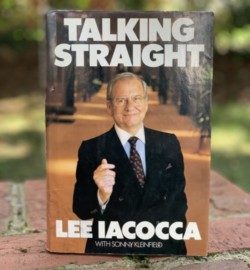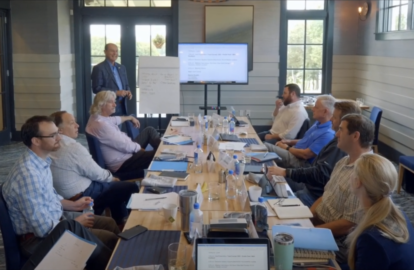Several analysts are saying there will be an economic downturn in the the next year or two. If that’s the case, is that the best time for you to sell your company to a third party, or to a partner, or pass it on you your children? What about closing it altogether? So, when is the best time to sell? As a downturn approaches? During the downturn? Or as the industry starts its upswing? Here’s one case of a manufacturing company approaching a partial sale as the last downturn in 2007 began.
Bill Smith founded Bill Smith Manufacturing, a plastics manufacturer for the carpet industry, in the early 1950’s. Bill ran the company for four decades before transitioning majority ownership to his son Billy. The company was successful over the years and both Bill and Billy achieved significant wealth.
In the early 2000’s, Billy and Bill hired Mitch, a veteran third-party industry executive from one of their vendors, to help lead the company. They enticed Mitch with the promise of a leadership role and the potential for ownership in a couple years. Mitch was a great leader, loyal employee, and hard charging salesman who immediately made a positive impact. After two years, Mitch purchased 10% of the company, paying a fair market price, and putting 25% cash down.
For the next several years, the company prospered under Mitch’s leadership. Billy (the son) spent increased time volunteering and on mission trips. He only averaged two days a week in the office. Bill (the father) continued his life’s work in the company he founded. Yet he came to the office daily, and his productivity reflected his age.
When the construction market faltered in 2007 and revenue began to fall, Billy felt guilty because he was removed from operations. Given his regular absence, he thought it was best to transition additional ownership to Mitch. He spent countless hours working with the company’s attorney and accountant constructing a deal. Without prior communication, Billy and Bill called Mitch into a meeting during which the attorney presented a term sheet to sell the rest of the company to Mitch. Initially, Mitch offered no reaction. He waited two weeks before politely declining due to his fears about the economy and belief the price was too high.
The next several years were tough for Bill Smith Manufacturing, as was true for many construction companies. They were forced to make layoffs and reduce pay for remaining staff. When business stabilized in 2013, Billy resumed work with their attorney and accountant to structure another term sheet to present to Mitch. Again, without prior communication, Billy and Bill called Mitch into a meeting during which the attorney presented a second offer to sell to Mitch. The term sheet was essentially unchanged, and so was Mitch’s reaction. He waited two weeks before politely declining.
After the second failed attempt, Billy, upon his accountant’s recommendation, reached out to our organization, NAVIX, for help in early 2014. After conversations with Bill and Billy, we discerned their objectives were to extract reasonable value from the business via a sale, to preserve the strong culture of Bill Smith Manufacturing, and to minimize overall taxation. They believed the best way to achieve their goals as to sell the rest of the company to Mitch, but if they could not reach agreement with Mitch they would pursue selling the company to an outside buyer.
We met with all parties individually to talk about price. Not surprisingly, Bill and Billy thought it was worth more, and Mitch thought it was worth less. Collectively, we decided that to reverse the process that had been used earlier. Rather than Bill and Billy present Mitch with a sale terms and price, Mitch would present a purchase offer to the father and son. This new approach could change the dynamics compared to prior conversations.
The offer that Mitch ultimately presented was a lower price than Bill and Billy had earlier asked him to pay, but it his offer included elements that emphasized protecting the company’s strong culture, and gave Bill and Billy more upside potential over time. Mitch offered to purchase only 65% of the company, leaving him with a total of 75% ownership and Bill and Billy holding the remaining 25%. That way if and when the company grew again Bill and Billy could command a higher proportionate price for their remaining 25% interest. Mitch’s offer also included guaranteed payments to Bill as the company’s Chairman Emeritus, and to Billy to remain on the company board. This gave the father and son a continued role in supporting the company. Finally, Mitch had secured outside financing allowing him to pay 25% cash down on the purchase, and committed to not taking any salary increases or receiving any dividends until all debt related to the transaction was paid off.
Mitch’s offer seemed to align all three co-owners’ interests. During his presentation, Mitch conveyed to both Smiths that they might potentially receive a higher value from sale to an outside buyer, but an outside buyer was unlikely to understand or continue the company’s culture. Mitch also explained his offer was the best he could do without over leveraging the business and sacrificing its longevity. He closed by saying that only the Smiths could decide how much these factors were worth to them.
After minimal negotiation, the Smiths elected to go ahead with Mitch’s offer. Bill Smith Manufacturing entered 2016 on a positive trend. All interests are aligned, and Mitch is confident he can get the Smiths more money on the next sale.
The following table shows a summary analysis of why the third time was the charm for the Smiths. We assumed ordinary income tax rates of 40% and capital gains tax rates of 23.8%. Calculations exclude Mitch’s prior ownership of 10%.
These clients achieved their goals of extracting reasonable value, maintaining the company culture, and minimizing taxes. All of this was accomplished while lessening the Smiths’ risk, and allowing them to maintain a material level of ownership.


